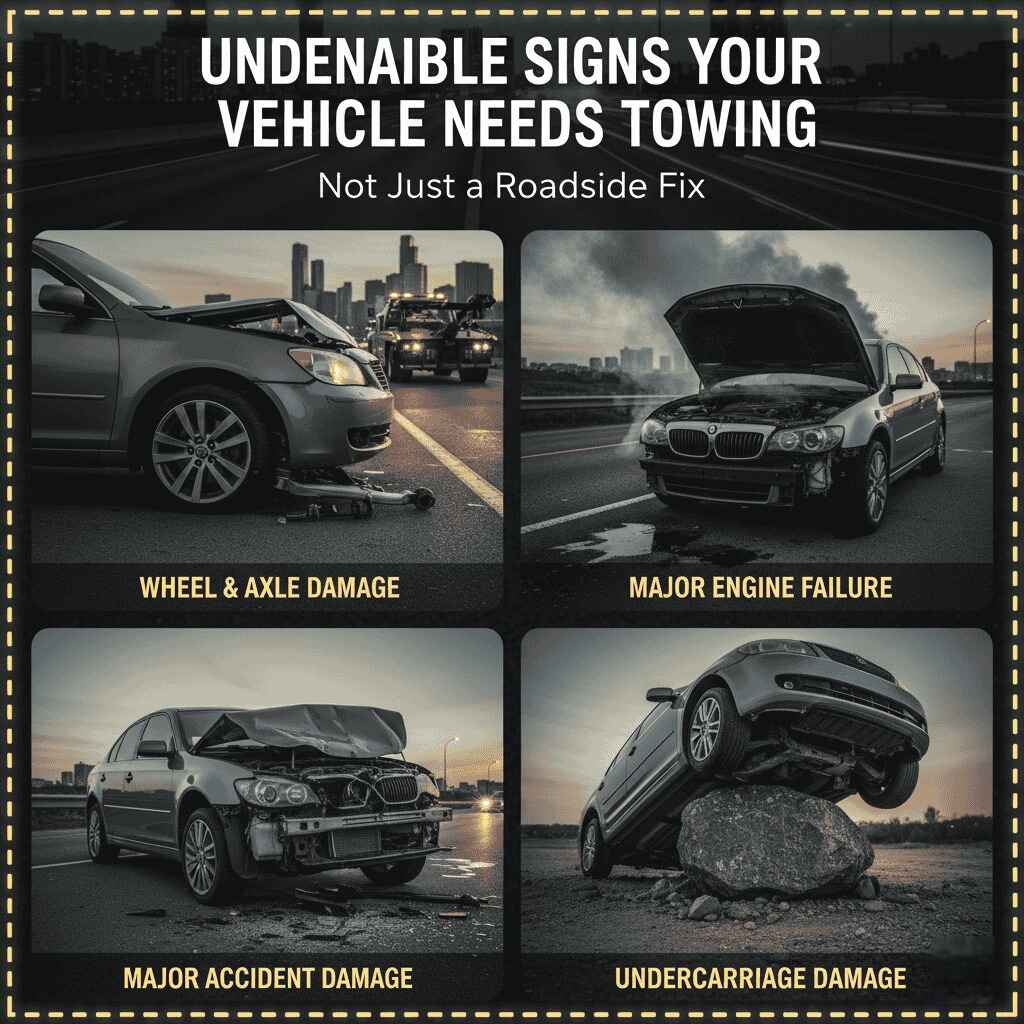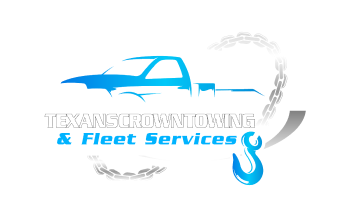1. The Critical Difference: Towing vs. Temporary Repair
You’re on the side of the road, lights flashing, the smell of hot oil in the air. That moment of truth hits: Can I fix this with a can of sealant, a jump-start, or a quick tire change?
As seasoned experts, we know the difference between a minor roadside inconvenience and an issue that requires the safe, damage-free transport of your vehicle to a repair shop. Trying to nurse a critically damaged vehicle further down the road is the fastest way to turn a $300 repair into a $3,000 engine replacement. This guide is your no-nonsense checklist for when it’s time to stop driving and start calling a professional.
2. Signs You Need to Pull Your Car Over: The Stop-Driving Alarms
Your dashboard is your vehicle’s critical communication center. While the yellow “Check Engine” light might allow you a few miles, certain red warnings signal immediate, imminent failure. These are the top Signs You Need to Pull Your Car Over and shut the engine off, period.
Flashing Check Engine Light: Unlike a solid light, a flashing light means the engine is misfiring badly, often dumping raw fuel into the exhaust. This can quickly melt and destroy the catalytic converter.
The Red Oil Pressure Light: This light means your engine is being starved of lubrication. Every second the engine runs, internal metal components are grinding against each other. Stop immediately.
The Red Temperature Gauge (Maxed Out): Your engine is overheating. Continuing to drive risks warping the cylinder head or blowing the head gasket, which often leads to a seized engine.
3. The Sensory Warnings: Smoke, Fire, and the Smell of Disaster
Not all warnings come from a computer chip; some come from your nose and eyes. If you see or smell any of the following, your car is communicating a potential fire hazard or catastrophic failure:
Thick, Dense Smoke from the Hood: Whether it’s white (steam/coolant) or black (burning oil/fuel), smoke means something is dangerously hot and failing.
The Smell of Burning Plastic or Electrical Wire: This is a key indicator of an electrical short circuit. Electrical fires can start small and spread rapidly throughout the vehicle’s wiring harness.
Heavy Fuel Smell: A strong gasoline or diesel odor signals a fuel leak. Given the proximity to the hot engine and exhaust system, this is an extreme fire risk.
4. System Failure: When Your Brakes or Steering Give Out
These systems are non-negotiable for safe driving. Any compromise to steering or braking capacity requires a tow, as attempting to drive puts you and everyone else on the road in immediate danger.
Brake Pedal Sinking to the Floor: This suggests a massive loss of hydraulic pressure, likely due to a brake line or master cylinder failure. Your car may not stop when you need it to.
Sudden Loss of Power Steering: If the steering wheel becomes extremely heavy and difficult to turn, the power steering pump or belt has likely failed. While you can manually steer, the reduced control makes highway driving highly risky.
Violent Shaking or Wheel Wobble: If a tire has suffered a major failure (like a tread separation) or a critical suspension component has broken, the car becomes uncontrollable at speed. This is a definitive Signs You Need to Pull to the side and call for professional transport.
5. Complete Engine Shutdown: When a Jump-Start Isn’t Enough
A dead battery is common, but what about when the car simply refuses to respond after a successful jump, or if it dies again a few minutes later?
The Car Cranks But Doesn’t Catch: This suggests a problem with the fuel delivery system (pump or injectors), or a total failure of the ignition system (spark plugs, coils).
The Car Dies Immediately After Jump-Start: This often means the alternator, which recharges the battery while driving, has failed. Your car is only running off the temporary battery charge and will die again very quickly.
The Engine is Seized: If you turn the key and only hear a single, sharp click followed by silence, the engine may be mechanically locked up due to severe overheating or lack of oil. It cannot be driven, not even a foot.
6. Pull Over After an Accident (Even a Minor One)
It’s tempting to assess the damage after a fender-bender, drive away, and deal with insurance later. However, accident-related damage is deceptive. If your vehicle was struck in a way that affects the frame, suspension, or fluid lines, driving it can compound the damage or lead to a failure while in traffic.
Visible Fluid Leakage (Post-Impact): Leaking oil, coolant, or transmission fluid means essential systems are compromised.
Wheel Misalignment/Dragging: If a wheel is bent, rubbing, or pointing the wrong way, driving will destroy the tires, bearings, and potentially the axle.
Deployed Airbags: This is a clear indicator that the impact was significant enough to compromise the vehicle’s structural integrity. Always tow an airbag-deployed vehicle.
7. Signs You May Be in Need of Towing Services for Transmission Issues
The transmission is one of the most complex and expensive components to repair. Unlike a brake pad, a transmission issue almost always necessitates a trip to a specialist garage via a tow truck.
Gears Slipping or Refusing to Engage: The car revs but doesn’t accelerate, or slams into gear roughly. Driving this way rapidly generates heat and destroys the internal friction plates.
Burning, Acrid Smell of Transmission Fluid: This indicates critical overheating of the fluid, a sure-fire Signs You May Be in Need of Towing Services immediately to prevent total transmission failure.
Total Immobility: You can shift into Drive or Reverse, but the car doesn’t move at all. The link between the engine and the wheels is completely severed.
8. Flat Tire Woes: When to Tow vs. Change the Spare
Yes, you can often change a flat yourself. But there are crucial circumstances where calling a professional for a tow or roadside tire service is the only safe option:
Unsafe Location: On a busy freeway shoulder, a blind curve, or in heavy rain/fog. Your life is not worth the risk of changing a tire near fast-moving traffic.
No Spare/Damaged Wheel: If your wheel has been destroyed by driving on a flat, or if you simply don’t have a spare, you have no option but to tow.
Specialty Vehicles: Luxury, low-profile, or all-wheel-drive vehicles often require special lifting equipment (like a flatbed tow truck) to prevent damage.
9. Locating Dependable Towing Services in Texas
When these critical events occur, you need prompt, reliable, and trustworthy service. Texas roads, known for their size and volume, require a towing company with the reach and professionalism to handle any situation, anytime.
A reputable provider of Towing Services in Texas must offer: fast response times, proper licensing and insurance, and a fleet of modern, well-maintained flatbed trucks to ensure zero secondary damage to your vehicle. Don’t rely on the first search result; rely on a partner with a proven commitment to customer safety and speed.
10. Frequently Asked Questions
Is it safe to drive my car to the mechanic if the oil pressure light flickers on and off?
No. An oil pressure light, even flickering, means the engine is losing lubrication. Continuing to drive can cause complete and permanent engine failure within minutes, costing thousands more than a tow.
My car overheated, but it cooled down. Can I drive it now?
The underlying cause of the overheating (leak, broken fan, etc.) is still present. Driving it again will likely cause it to overheat again very quickly. Towing is the only safe way to get it to a repair facility.
How can I tell if a leak is a minor issue or one that requires towing?
Size and Color are key. If you see a large, spreading puddle (especially red/brown transmission fluid or thick, dark oil) or any fluid that is leaking rapidly, it requires a tow. A small drip of clear water (AC condensation) is usually fine.
Your Partner for Total Roadside Peace of Mind
Recognizing these 10 definitive signs that your vehicle needs professional intervention is the mark of a smart, responsible driver. The split-second decision to stop and call for a tow protects your investment and ensures your safety. Never gamble with your car’s most vital systems.
When the road throws you a curveball and you need prompt, courteous assistance, remember the team committed to protecting you and your vehicle across the Lone Star State.
At Texans Crown Towing, we’re here to help with professional, fast, and friendly towing and roadside assistance—wherever and whenever you need us.
Don’t risk the drive—call the Texas roadside assistance towing experts now and secure your total peace of mind.



